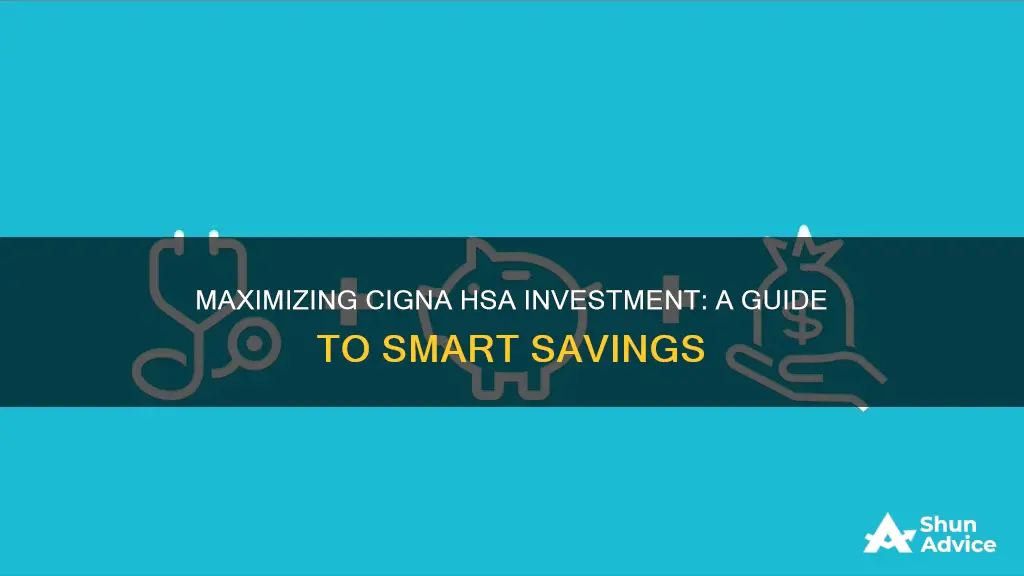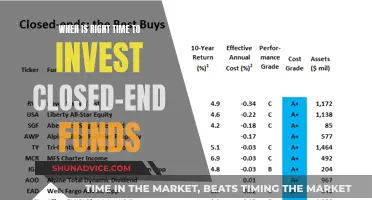
Cigna's Health Savings Account (HSA) is a tax-exempt savings account that allows individuals to contribute pre-tax dollars to pay for covered health care costs. This account is opened through an HSA provider chosen by the individual's employer. Contributions to the HSA can be made by the individual, their employer, or others, up to a yearly limit set by the IRS. The HSA can be used to pay for qualified health care expenses, including medical, prescription drug, dental, and vision services. Unused funds roll over from year to year, and once a minimum threshold is met, the funds can be invested. HSA funds can be accessed through a debit card, checks, or auto-pay, and withdrawals for eligible health care expenses or investments are not subject to federal income taxes.
What You'll Learn
- Cigna's HSA funds can be used to pay for eligible health care expenses
- You can save and invest for retirement with Cigna's HSA
- Cigna's HSA funds are tax-advantaged
- Cigna's HSA funds can be used for medical, prescription, dental, and vision expenses
- Cigna's HSA funds can be used for yourself, your spouse, or dependents

Cigna's HSA funds can be used to pay for eligible health care expenses
Cigna's Health Savings Account (HSA) is a bank account that allows you to pay for eligible health care expenses or save and invest for retirement. It is a tax-advantaged account, offering a triple tax advantage with no federal income taxes on HSA contributions, withdrawals for eligible health care expenses, or investment earnings. HSA contributions and earnings are generally not subject to state taxes as well.
With a Cigna HSA, you can decide how and when to use the funds. You can use the money to pay for qualified health care expenses for yourself, your spouse, or dependents you can claim on your federal income tax. This includes expenses related to medical, prescription drugs, dental, and vision care. Additionally, you can choose to save the money, as unused dollars roll over from year to year.
The funds in your HSA can earn interest, and once a minimum threshold is met, you can choose to invest the money. This provides an opportunity for long-term savings and investment growth. It's important to note that you can continue contributing to your HSA even if you leave your Cigna Healthcare plan, change jobs, or retire.
Cigna's HSA is designed to give you flexibility and control over your healthcare finances. It is a valuable tool to help you manage and plan your healthcare expenses, especially if you are prepared to take a more active role in your healthcare decisions.
Best Funds to Maximize Your 401k Returns
You may want to see also

You can save and invest for retirement with Cigna's HSA
A Health Savings Account (HSA) is a bank account that you own, which you can use to pay for eligible healthcare expenses or to save and invest for retirement. When you enroll in the Cigna Choice Fund High-Deductible HSA plan, Cigna automatically opens a health savings bank account for you through HSA Bank.
The Cigna HSA plan covers the costs of health care professionals both in-network and out-of-network, although out-of-network facilities may be covered at a lower percentage than in-network facilities. Preventative care office visits and related procedures performed in the doctor's office are covered at 100% only in-network. Some preventive drugs are covered at 100% with no co-pay or deductible.
You can use HSA money to pay for qualified health care expenses related to medical, prescription drugs, dental, and vision. You can also choose to save the money – unused dollars roll over from year to year. Whatever you don’t use can earn interest and can be invested once a minimum threshold is met. Any interest or investment earnings on HSA funds are tax-advantaged. HSA contributions and earnings are not subject to federal taxes and not subject to state taxes in most states.
You can use the online bill-pay feature, free of charge, to have a check sent to yourself or your health care professional for qualified health care expenses that are not reimbursed. You can also use your HSA debit card to pay for eligible services at the doctor’s or dentist’s office and your local pharmacy.
Maximizing HSA Investments: A Bogleheads Guide to Smart Investing
You may want to see also

Cigna's HSA funds are tax-advantaged
Cigna's Health Savings Account (HSA) is a tax-advantaged account that offers a triple tax advantage. Firstly, contributions to the HSA are not subject to federal income taxes. This means that money is deposited directly from your paycheck into the account before it is taxed, so you don't pay taxes on those wages. Secondly, withdrawals from the HSA for eligible health care expenses are also not taxed. Finally, investment earnings on HSA funds are tax-advantaged. This means that any interest earned on the HSA balance is not subject to federal income taxes, and in most states, it is also exempt from state taxes.
The tax advantages of a Cigna HSA provide significant benefits to account holders. By contributing pre-tax dollars to the HSA, individuals can reduce their taxable income, resulting in potential tax savings. Additionally, the tax-free withdrawals for eligible health care expenses allow individuals to pay for medical, prescription drug, dental, and vision expenses without incurring additional taxes. This can be especially advantageous for individuals with high medical costs or those who want to save for future healthcare needs.
The tax advantages of a Cigna HSA also extend to investment earnings. Once the HSA balance reaches a minimum threshold, individuals can choose to invest their HSA funds to earn interest. This feature provides an opportunity for account holders to grow their savings over time while still maintaining the tax benefits associated with the account. The interest earned on HSA funds is not subject to federal income taxes, which can result in significant tax savings, especially over the long term.
It is important to note that there are certain restrictions and limitations associated with Cigna's HSA. For example, the account can only be opened if you have a qualified High-Deductible Health Plan (HDHP) and are not covered by any other non-HDHP health plan. Additionally, there are contribution limits set by the IRS, and withdrawals made before the age of 65 for non-healthcare expenses may be subject to income taxes and a penalty tax. However, with proper planning and adherence to the guidelines, individuals can maximize the benefits of their Cigna HSA and take advantage of the tax advantages it offers.
Smart Ways to Invest 1000 Rupees in Mutual Funds
You may want to see also

Cigna's HSA funds can be used for medical, prescription, dental, and vision expenses
Cigna's Health Savings Account (HSA) is a tax-advantaged bank account that allows you to pay for eligible health care expenses and save for retirement. This account is opened through an HSA provider chosen by your employer and can be used to pay for qualified health care expenses for yourself and your covered dependents.
Cigna's HSA funds can be used for a range of health-related expenses, including medical, prescription, dental, and vision care. This includes preventive care office visits and related procedures performed in the doctor's office, as well as some preventive drugs with no co-pay or deductible. You can also use the funds to pay for out-of-network health care professionals, although the coverage may be at a lower percentage than in-network facilities.
The HSA gives you the flexibility to decide how and when to use the funds. You can choose to pay for eligible services directly from your account using a debit card or check, or you can save the money and let it roll over from year to year, earning interest. Once a minimum threshold is met, you can even invest your HSA funds in a tax-advantaged investment account.
It's important to note that HSA contributions and withdrawals for eligible health care expenses are not subject to federal income taxes, providing a significant financial benefit. Additionally, you can continue contributing to your HSA if you leave your Cigna Healthcare plan, change jobs, or retire, ensuring that your savings can grow over time.
Index Funds vs Roth IRA: Where Should You Invest?
You may want to see also

Cigna's HSA funds can be used for yourself, your spouse, or dependents
Cigna's Health Savings Account (HSA) is a bank account that allows you to pay for eligible healthcare expenses and save for retirement. It is a tax-advantaged account, offering a triple tax advantage with no federal income taxes on HSA contributions, withdrawals for eligible health care expenses, or investment earnings. HSA funds can be used for yourself, your spouse, or dependents, providing flexibility in covering healthcare costs.
When you enrol in the Cigna Choice Fund HSA plan, Cigna automatically opens a health savings bank account for you through HSA Bank. This account is designed to help you pay for qualified healthcare expenses, including medical, prescription drug, dental, and vision care. You can also choose to save the money, as unused funds roll over from year to year. This feature allows you to build a long-term savings cushion for future healthcare needs.
The HSA funds can be used in several ways. You can use the online bill pay feature to send a check to yourself or your healthcare professional for qualified health care expenses. Alternatively, you can use the provided HSA debit card to pay for eligible services at doctors' or dentists' offices and local pharmacies. Additionally, you have the option to purchase an HSA checkbook and use checks to reimburse yourself for qualified, out-of-pocket expenses or to pay your healthcare provider directly.
Cigna's HSA gives you control over how and when to use the funds. You can decide to use the money as you incur qualified health care expenses or let it grow over time by earning interest. Once a minimum threshold is met, you can even choose to invest your HSA funds to potentially grow your savings further. This flexibility allows you to tailor your HSA usage according to your specific needs and financial goals.
It's important to note that HSA funds can only be spent on family members who qualify as true tax dependents. If your adult children don't qualify as tax dependents, they may still be able to open their own HSAs and contribute the full amount allowed by the IRS for a family or an individual. Be sure to consult with a tax advisor to understand the IRS guidelines and make informed decisions regarding your HSA usage.
Mutual Fund Investment: Answers to Your Questions
You may want to see also
Frequently asked questions
A Health Savings Account (HSA) is a bank account that you own to pay for eligible health care expenses or to save and invest for retirement.
When you enroll in the Choice Fund HSA plan, Cigna automatically opens a health savings bank account for you through HSA Bank. You can then decide how and when to use the funds.
You can use HSA money to pay for qualified health care expenses related to medical, prescription drugs, dental, and vision. You can also choose to save the money – unused dollars roll over from year to year.
HSA contributions and earnings are not subject to federal taxes and not subject to state taxes in most states. This means that you can contribute pre-tax dollars to your HSA, and the growth of your HSA funds is tax-free.







